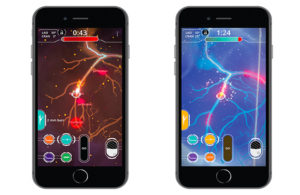
(Images from Level Ex)
Philips (NYSE:PHG) wants to use video games to make it fun for interventional cardiologists to learn how to use its technology.
The company has signed on as the first sponsor of Cardio Ex, the first heart-related game by medical video game maker Level Ex. Cardio Ex has four levels and features Philips’ Eagle Eye platinum digital intravascular ultrasound (IVUS) catheters, its Verrata Plus pressure wire with instantaneous wave-free ratio (iFR) modality, ELCA laser atherectomy catheter and AngioSculpt PTCA scoring balloon catheter. Other companies have signed on as Cardio Ex sponsors as well, according to Level Ex, but the company declined to name them.
Cardio Ex gives players a timed task for each level, tips on how to achieve it and warnings about the consequences of making mistakes. The games in Level 1 focus on each patient’s specific problem, such as stenosis, and begin by having the player choose the type and size of device they’d use to treat it. They also indicate when the patient is in danger of dying or if the player has saved a life.
Level Ex launched its first game for doctors in 2016. Besides Cardio Ex, its games include Airway Ex, Gastro Ex and Pulm Ex. Level Ex researches how each company’s medical devices are used and talks with brand managers and sales representatives about the difficulties doctors report with using them, according to Dr. Eric Gantwerker, VP and medical director for the company.
The company sends teams out to cardiac catheterization labs to see the devices in action. It has engineers and artists work with medical teams to create the procedures it will put in the app and has doctors with no ties to sponsors test-play prototype games.
“We have over 150 physician advisors who work with us across all of our apps,” Gantwerker told Medical Design & Outsourcing in an interview.
The length of the game depends on the device Level Ex is showcasing, but the company keeps the games short. “We don’t want to simulate the entire procedure,” Gantwerker said. “A lot of this stuff is pretty rote and they don’t necessarily need to know it.”
Most users spend seven or eight minutes per session, “but we have a very high rate of replay,” Gantwerker said, “so (while) the individual case may not be long, the experience may be a lot longer.”
Chicago-based Level Ex creates mobile, AR and VR games for physicians using video game technology and cognitive neuroscience. The company estimates that nearly 4,000 cardiologists play its games, including one in four interventional cardiologists. Three of the top 10 medtech companies are sponsors, including Medtronic, whose AIRKit device is featured in the Airway Ex app.
The games are free on the App Store and Google Play, and players may earn continuing medical education credits. Players must register to use the games, and Level Ex captures information about their decision-making and moment-by-moment actions to inform the client and redesign the game. Philips learned about Cardio Ex about a year ago and was intrigued, according to Andrew Tochterman, the device maker’s VP & GM of coronary image-guided therapy devices.
“Ultimately, we’re always trying to challenge the way we solve barriers to appropriate adoption” of devices, Tochterman said. “It’s not even about our technologies as much as it is about how you interpret intravascular imaging in general.”
For example, one of the biggest barriers to the use of intravascular imaging is seeing the intracoronary ultrasound image and interpreting what it means, Tochterman added. This has been a challenge for Philips since it bought Volcano and its IVUS technology in 2015.
Cardio Ex teaches doctors how to locate arterial blockages, how to use IVUS to determine the size of the stent needed to treat the disease and how to interpret the imaging to optimize treatment. If cardiologists can learn from the game, Philips and other IVUS catheter-makers will benefit, Tochterman said.
“This is a way to really learn on specialized equipment,” he added. “If they fail, they fail, but hopefully through failure, they learn how to treat patients and optimize care. We think it’s a great compliment to the education they’re already getting in their fellowships.”




